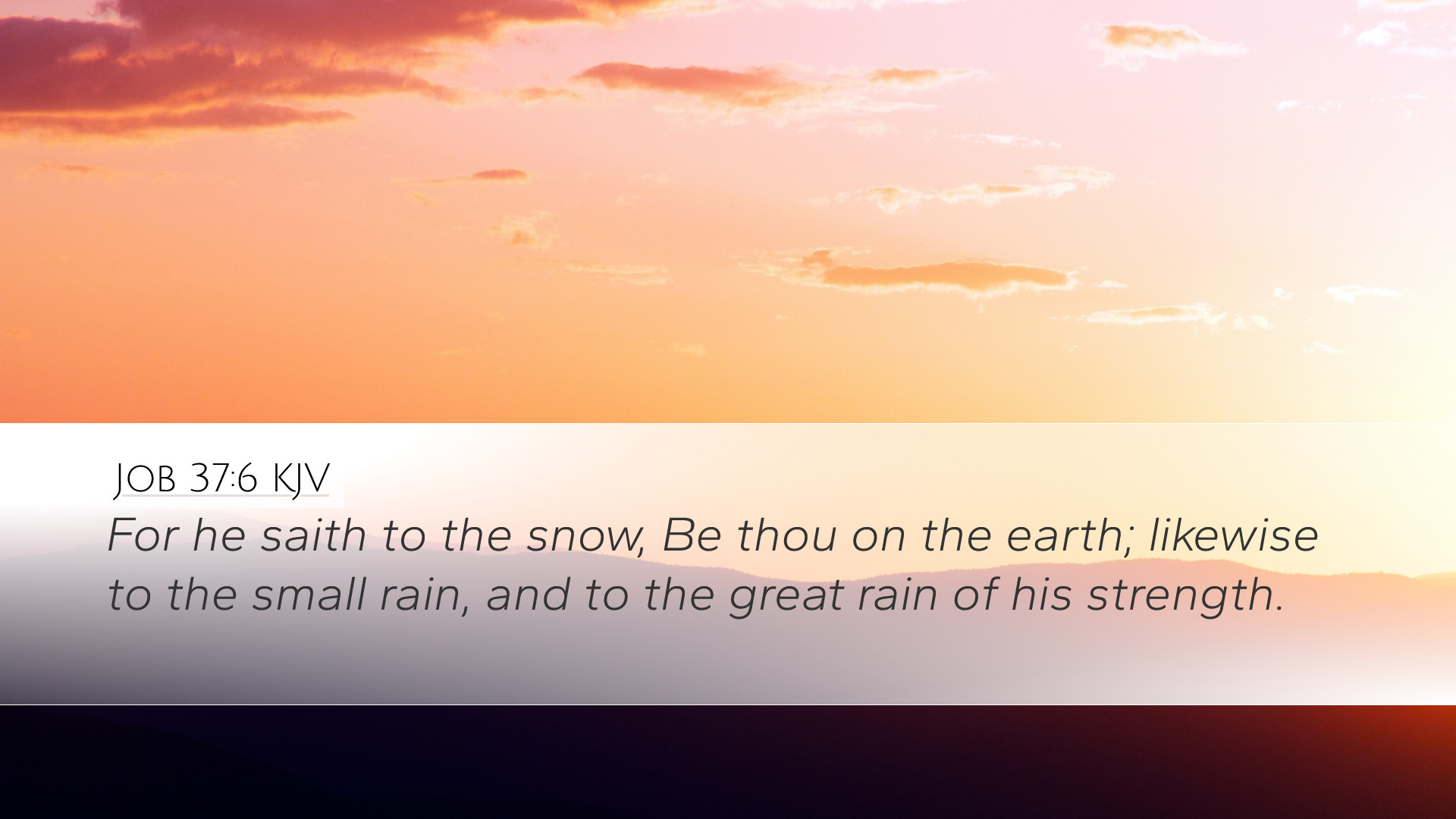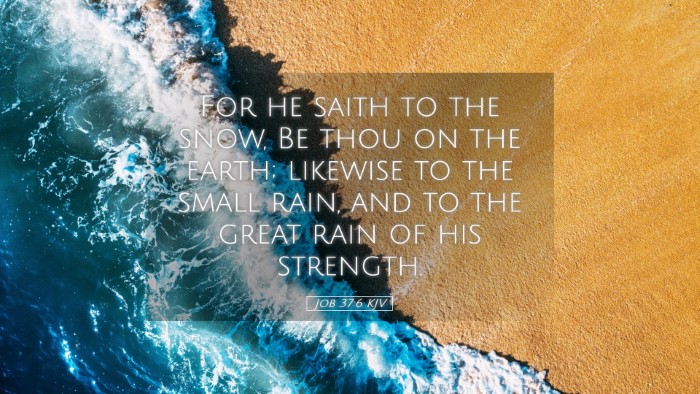Old Testament
Genesis Exodus Leviticus Numbers Deuteronomy Joshua Judges Ruth 1 Samuel 2 Samuel 1 Kings 2 Kings 1 Chronicles 2 Chronicles Ezra Nehemiah Esther Job Psalms Proverbs Ecclesiastes Song of Solomon Isaiah Jeremiah Lamentations Ezekiel Daniel Hosea Joel Amos Obadiah Jonah Micah Nahum Habakkuk Zephaniah Haggai Zechariah MalachiJob 37:6
Job 37:6 KJV
For he saith to the snow, Be thou on the earth; likewise to the small rain, and to the great rain of his strength.
Job 37:6 Bible Commentary
Commentary on Job 37:6
Job 37:6 states: "For he saith to the snow, Be thou on the earth; likewise to the small rain, and to the great rain of his strength." This verse falls within a speech of Elihu, the youngest of Job's friends, who introduces a divine perspective on God's power in nature and the cosmos. It serves to highlight the control and authority of God over the elements, emphasizing His sovereignty as the Creator.
Understanding the Context
The context of this passage is significant, as it captures Elihu's attempts to address Job's despair and his longing for understanding regarding his suffering. Elihu calls attention to the natural world to illustrate God's greatness and His governance over the earth. He aims to shift Job's focus from his own plight to the greater reality of God's wisdom and omnipotence.
Insights from Matthew Henry
Matthew Henry, in his commentary, emphasizes the authority of God over creation. He notes that God commands the snow and the rain, indicating that the elements are subject to His will. Henry highlights:
- God's Sovereignty: Henry stresses that the natural phenomena are not mere random occurrences but are orchestrated under divine command. This serves to remind Job that though he suffers, God remains in control of all circumstances.
- Purpose in Creation: The mention of both “snow” and “rain” signifies both the blessings and challenges of life. Snow can be representative of harshness and cold, while rain is a symbol of nourishment and life, suggesting that both aspects of creation hold purpose under God's providence.
Insights from Albert Barnes
Albert Barnes offers a detailed examination of the imagery presented in Job 37:6. He notes:
- Covenantal Language: Barnes points out that God’s command to the weather reflects the covenant relationship He shares with nature. This command evokes a sense of order where chaotic forces recognize divine authority.
- Human Perspective: The verse articulates a contrast between the understanding of divine will and human limitations. Just as humans cannot command the weather, they should recognize their position before the Almighty.
Insights from Adam Clarke
Adam Clarke provides rich theological reflections on this verse. He emphasizes several key dimensions:
- Theological Implications: Clarke highlights that God's voice is what brings the snow and rain to the earth. This underscores the belief that God is intimately involved in even the minutiae of creation, thus reinforcing His omnipresence.
- Encouragement for Faith: For those experiencing the trials of life, Clarke asserts that this passage should serve as a reminder of God’s ongoing work in the world. The seemingly random occurrences (like snow or rain) are ultimately orchestrated by God for either chastisement or blessing.
Theological Themes
As we analyze Job 37:6, several theological themes surface, which pastors, students, and scholars may find enriching:
- God’s Sovereignty: The passage illustrates the concept that God has supreme control over nature and life events. This sovereignty assures believers that no matter their circumstances, God governs all.
- Divine Providence: The command of God over the weather reflects His involvement in the world, suggesting that every storm and calm is utilized for His sovereignty and purpose.
- Understanding Suffering: Within the context of suffering, this verse invites reflection on the idea that while life may seem chaotic and uncontrollable, there is a divine order that undergirds existence.
Conclusion
Job 37:6 serves as a powerful reminder of God's majesty and authority. For pastors delivering messages on suffering, scholars exploring the theological implications of divine command, or students searching for clarity amid confusion, this verse offers profound insights.
Through the perspectives offered by respected commentators, we are reminded to trust in God's overarching wisdom and authority in all aspects of life, fostering a deeper reliance on the character and nature of God amid life's storms.


